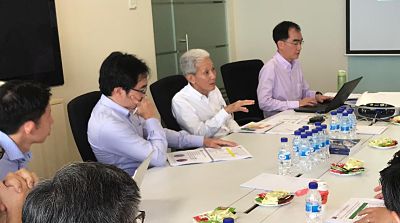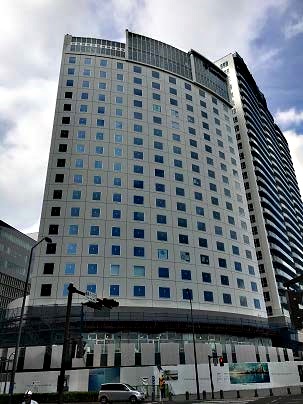|
Uni-Asia Group, which has core interests in ships and property, has a hotel operating segment that is increasingly gaining traction.
|
The number of hotels under management will expand further:  At 1Q19 results briefing: Michio Tanamoto, executive chairman | Lim Kai Ching, CFO (top, right).
At 1Q19 results briefing: Michio Tanamoto, executive chairman | Lim Kai Ching, CFO (top, right).
Photo: Colin Lum ♦ In Dec 2019, a new hotel will open in Fukuoka city. No. of rooms: 204.
♦ In 2020, 4 new hotels will open -- two in Osaka, one near Tokyo and one in Shikoku Island.
Total number of new rooms: 682.
That would bump up the total number operated by Uni-Asia to 3,401 rooms (after subtracting 152 rooms from a hotel whose operating contract ended in March 2019).
This will bring about economies of scale and, hopefully, turn the hotel segment into a sustainably profitable one -- although the industry as always is a competitive one.
Uni-Asia management pointed to major events that are positive for the hospitality industry this year and next:
|
♦ Unprecedented 10-day holiday (April 27 to May 6) to mark imperial succession in Japan and the Golden Week. |
There is a new accounting rule, the IFRS 16, which effectively "frontloads" expenses arising from Uni-Asia operating hotels leased from third party owners. The impact will be particularly felt this year and less so next year on both the income statement and balance sheet. You get a glimpse of that in the results for 1Q19, typically the slowest quarter: The hotel segment's loss after tax was US$1.0 million. It would have been about US$100,000 only under the previous accounting rule.
At the group level, 1Q19 profit attributable to shareholders would have been US$1.5 million higher if not for the adoption of IFRS 16: ie, US$5 million instead of US$3.5 million. Y-o-y, the increase would have been 57%, instead of 9%, respectively. The application of IFRS 16 is explained in the 1Q19 results presentation materials here. |
|||||||||||||||||








